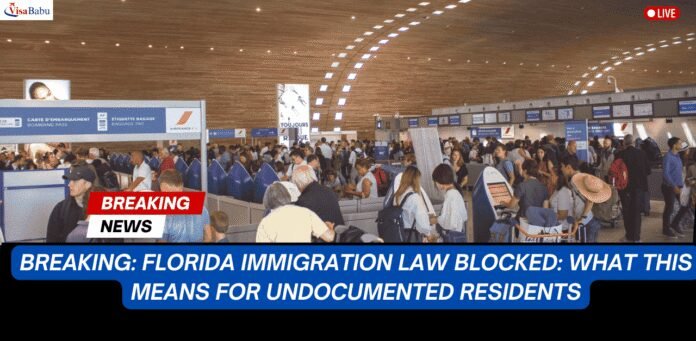Supreme Court Blocks Florida’s Controversial Immigration Law in Major 2025 Ruling
The Florida immigration law blocked by the Supreme Court represents a significant victory for immigrant rights advocates and a setback for state-level immigration enforcement efforts. On July 9, 2025, the nation’s highest court declined to allow Florida to enforce its controversial Senate Bill 4-C, leaving in place a lower court’s preliminary injunction that has prevented the law from taking effect since April.
What is Florida’s SB 4-C Immigration Law?
Florida’s Senate Bill 4-C, signed into law by Governor Ron DeSantis in February 2025, represents one of the most aggressive state-level immigration enforcement measures in recent years. The law makes it a state crime for undocumented immigrants to enter Florida if they have previously entered the United States illegally or re-entered after deportation.
Key Provisions of the Law
The statute mandates several severe penalties and obligations:
- Criminal sanctions: Makes it a misdemeanour for undocumented aliens to come into Florida
- Mandatory detention: Obliges the arrestee (under the law) to be held without bail before trial.
- Prison sanctions: Provides a nine-month jail term for the first offence and stiffer terms for subsequent violations
- Felony charges: Restoring one’s presence in Florida following deportation would constitute a felony offence
Timeline of Legal Challenges
The legal battle over Florida’s immigration law has unfolded rapidly since its passage:
| Date | Event | Court/Authority |
| February 2025 | SB 4-C was signed into law by Gov. DeSantis | Florida Legislature |
| April 5, 2025 | Temporary restraining order issued | U.S. District Judge Kathleen Williams |
| May 21, 2025 | Preliminary injunction granted | U.S. District Judge Kathleen Williams |
| June 9, 2025 | Appeals court denies stay request | 11th U.S. Circuit Court of Appeals |
| July 9, 2025 | Supreme Court declines emergency appeal | U.S. Supreme Court |
Federal Court Rulings Against the Law
U.S. District Judge Kathleen Williams has been instrumental in blocking the florida immigration law from taking effect. In her April ruling, Williams issued a 14-page decision granting a temporary restraining order, citing the federal government’s exclusive authority over immigration matters.
Constitutional Concerns Raised
Judge Williams highlighted multiple constitutional issues provoked by the statute.:
- Supremacy Clause violations: The law “unlawfully encroaches” on federal immigration authority
- Federal preemption: Immigration enforcement remains a federal responsibility under established precedent
- Due process concerns: Mandatory detention provisions limit federal courts’ discretion
- Commerce Clause issues: The statute imposes intolerable burdens upon interstate commerce.
Supreme Court’s Decision and Its Implications
The Supreme Court’s July 9, 2025, decision to deny Florida’s emergency appeal was delivered without explanation or noted dissents12. With its brief, unsigned per curiam decision, the court leaves the status quo intact while the rulings now under review in the lower courts are resolved..
What the Supreme Court Ruling Means
The high court’s refusal to intervene has several important implications:
- At once, the statute remains suspended until the judicial proceedings are brought to a close.
- Precedent reinforcement:
- State limitations: Demonstrates constitutional limits on state immigration enforcement
- Active litigation: The dispute will continue to proceed through the court’s appellate stages.
Opposition and Support for the Law
Civil Rights Organisations’ Response
Multiple civil rights organisations have challenged the law, arguing it violates constitutional principles and federal immigration authority:
- American Civil Liberties Union (ACLU): Filed the primary lawsuit challenging the law
- Florida Immigrant Coalition: advocates on behalf of the communities affected.
- Farmworker Association of Florida: Advocates for agricultural workers’ rights8
- Americans for Immigrant Justice filed this lawsuit as joint counsel.
Bacardi Jackson, executive director of the ACLU of Florida, stated: “This ruling affirms what the Constitution demands — that immigration enforcement is a federal matter”.
State Government’s Position
Florida Attorney General James Uthmeier has supported the legislation, contending that it accords with federal immigration policy and is essential to fight illegal immigration. The state’s position includes:
- Federal alignment: asserts that the statute complements federal immigration statutes
- Public safety: contends that the measure is required to safeguard Florida’s residents
- State authority: Citi
- Further appeals: Intends to carry on challenging the injunction in the lower courts.
Similar Laws Across the Nation
Florida’s immigration law is not unique. Several other states have attempted to pass similar legislation, with mixed results:
| State | Law Status | Court Action |
| Texas | Blocked | Federal appeals court injunction |
| Oklahoma | Blocked | Federal court ruling |
| Iowa | Blocked | Federal court intervention |
| Idaho | Blocked | Federal court decision |
The pattern of federal courts blocking these state immigration laws demonstrates consistent judicial interpretation that immigration enforcement remains primarily a federal responsibility.
Impact on Immigrant Communities
The Florida immigration law’s blocked ruling provides relief to thousands of undocumented immigrants and their families who would have been affected by the legislation. The law’s provisions would have created significant hardships:
Potential Consequences Avoided
- Family separation: Mandatory detention would have separated families
- Economic disruption: Farming and service businesses would have been shorthanded.
- Fear and uncertainty: The immigrant communities would have been subjected to more anxiety
- Legal complications: Conflict between state and federal law could have produced considerable confusion.
Federal Immigration Policy Context
The legal challenge to Florida’s law occurs within the broader context of federal immigration policy under the Trump administration. President Trump has made immigration enforcement a central priority, including:
- Mass deportation plans: Promises to deport millions of undocumented immigrants
- Federal enforcement: ICE carried out expanded operations and enlarged detention capacity.
- State cooperation: urging states to back federal immigration efforts.
- Border security: Enhanced border patrol and detention capabilities
Legal Precedent and Constitutional Principles
The courts’ consistent blocking of state immigration laws reflects well-established constitutional principles:
Supremacy Clause
The U.S. Constitution’s Supremacy Clause establishes that federal law takes precedence over state law when conflicts arise. For many years, immigration has been acknowledged as a domain of exclusive federal authority.
Federal Preemption Doctrine
Courts repeatedly have concluded that federal immigration statutes preclude states from passing immigration regulations, especially when these measures clash with the federal government’s enforcement objectives.
What’s Next for the Legal Battle
The Florida immigration law blocked case will continue through the federal court system:
Upcoming Legal Proceedings
- At the appellate stage: In October 2025, the Eleventh Circuit Court of Appeals is slated to hear the matter.
- Possible Supreme Court involvement: The case may eventually return to the Supreme Court for a full review.
- Preliminary proceedings: The district court will keep hearing the underlying constitutional challenge.
- Injunction hearings: Routine examinations of the preliminary injunctions in effect.
Possible Outcomes
Several possible developments may unfold as the case advances:
- A permanent injunction: The statute might be permanently enjoined.
- Partial enforcement: Some sections could be allowed to operate, while others continue to remain blocked.
- Complete reversal: The law could eventually be allowed to take effect (unlikely given precedent)
- Legislative procedural steps: Florida could amend the statute in order to mitigate the constitutional challenges the courts have outlined.
Broader Implications for State Immigration Policy
The Supreme Court’s decision to maintain the block on Florida’s immigration law sends a clear message about the limits of state authority in immigration matters. Consequently, this affects the course of:
Other State Legislation
Intending to replicate such initiatives, states could adjust their strategies, aware that federal courts have repeatedly invalidated them.
Federal-State Relations
The ruling reinforces the principle that immigration policy remains primarily a federal responsibility, limiting states’ ability to create their enforcement mechanisms.
Political Consequences
These legal setbacks could shape political discussions on immigration policy and the extent to which states should become involved in enforcement.
Economic and Social Impact
The blocking of Florida’s immigration law has significant economic and social implications:
- Economic Effects: Industries relying on immigrant labour avoid disruption
- Labour market stability: Sectors that depend on immigrant workers stay largely untouched.
- Agricultural sector: Farmworkers remain assured that they can carry out their vital labour unimpeded
- Service sector: Within the service sector, restaurants, hospitality, and construction sectors sustain consistent workforce stability.
- Tax revenue: The sustained economic activity of immigrant communities.
Social Consequences
- Community safety: immigrants are more inclined to report crimes and assist police.
- Educational access: Children may study in school without the threat of family separation.
- Healthcare utilisation: Families are more likely to obtain the necessary medical care.
- Social cohesion: Lowered tension and fear prevail within mixed-status communities.
The Florida immigration law blocking ruling represents more than just a legal victory for immigrant rights advocates. It reinforces fundamental constitutional principles about the division of authority between federal and state governments, particularly in the complex area of immigration policy. As the legal battle continues through the courts, the case will likely serve as an important precedent for future state attempts to regulate immigration independently of federal policy.
The Supreme Court’s decision to maintain the injunction while providing no explanation suggests the justices see little merit in Florida’s constitutional arguments. This silent rejection speaks volumes about the strength of established precedent regarding federal supremacy in immigration matters.
For Florida’s immigrant communities, the ruling provides temporary relief and continued protection from what many viewed as discriminatory and unconstitutional legislation. However, the ongoing legal proceedings mean uncertainty remains about the law’s ultimate fate.
The case also highlights the ongoing tension between state and federal authorities over immigration policy, particularly as states seek to address what they perceive as federal inaction or inadequate enforcement. The consistent pattern of federal courts blocking state immigration laws suggests that meaningful immigration reform will require federal legislative action rather than state-by-state initiatives.
As the legal proceedings continue, all eyes will be on the October 2025 appeals court hearing, which could provide more definitive guidance on the constitutional issues at stake. Until then, the Florida immigration law remains a powerful symbol of the ongoing struggle over immigration policy in America.
For more updates like this, please visit: http://visababu.com
Frequently Asked Questions(FAQs)
Q: What is Florida’s SB 4-C immigration law?
A: Florida’s Senate Bill 4-C is a state law signed by Governor Ron DeSantis in February 2025 that makes it a crime for undocumented immigrants to enter Florida if they previously entered the U.S. illegally or re-entered after deportation. The law includes mandatory detention and prison sentences ranging from nine months to five years.
Q: Why did the Supreme Court block Florida’s immigration law?
A: The Supreme Court declined to lift a lower court’s injunction blocking the law, effectively maintaining the block. While the Court did not explain, lower courts have ruled that the law violates the Constitution’s Supremacy Clause because immigration enforcement is a federal responsibility, not a state one.
Q: How long will Florida’s immigration law remain blocked?
A: The law will remain blocked while legal proceedings continue. The 11th U.S. Circuit Court of Appeals is scheduled to hear arguments in October 2025, and the case could eventually return to the Supreme Court for full consideration.
Q: Are other states trying to pass similar immigration laws?
A: Yes, several states, including Texas, Oklahoma, Iowa, and Idaho, have attempted to pass similar laws criminalising illegal immigration at the state level. However, federal courts have blocked all of these laws, citing constitutional concerns about federal preemption in immigration matters.
Q: What happens to undocumented immigrants in Florida now?
A: With the law blocked, undocumented immigrants in Florida cannot be prosecuted under SB 4-C’s provisions. However, they remain subject to federal immigration enforcement and potential deportation under existing federal law.
Q: Who challenged Florida’s immigration law in court?
A: The law was challenged by several civil rights organisations, including the ACLU, Florida Immigrant Coalition, Farmworker Association of Florida, and Americans for Immigrant Justice, along with individual plaintiffs who would be affected by the law.
Q: What constitutional issues does the law raise?
A: Courts have identified several constitutional problems with the law, including violations of the Supremacy Clause (federal authority over immigration), due process concerns (mandatory detention), and Commerce Clause issues (burdens on interstate commerce).




